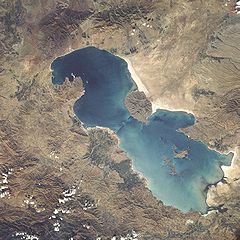In the past two weeks, ADAPP has been busy monitoring the conflict between local inhabitants affected by Lake Urmia and the ignorance from the Iranian government.
Lake Urmia is currently the largest lake (salt-water based) in the Middle East and is home to some of the region’s most diverse ecosystems and the source of water and agricultural security for over 13 million inhabitants of the region. However, for decades, the Iranian government have started and stopped many harmful projects such as a bridge across the lake as well as irresponsible irrigation. The Iranian government did actively build dams on more than 20 tributaries feeding into the lake all of which are responsible for drastically causing over 60% of the lake’s water to evaporate. Not only does the lack of water affect such a large population’s basic survival, the increased salt content can spread disease and contamination, through winds, to neighboring countries of Azerbaijan, Turkey, Iraq, and Armenia.
Some insights/experiences/lessons learned from the past two weeks working on this project:
1. I was shocked to learn that people in Iran had to fight for water rights. It is absolutely astounding just to think about that people who fight on a daily basis for basic human rights of freedom of speech, peaceful assembly, and peaceful protest have to also worry about a basic need for survival. UNESCO has deemed Lake Urmia to be a biosphere reserve and a crucial ecological and economic part of the region. Many would argue that if this possible ecological disaster happened in a central part of Iran where Persians were the majority, the government’s response would have been much faster and helpful.
2. I am very proud of the resistance and the perseverance of these peaceful protesters in the cities of Tabriz and Urmia. The first recent demonstration started on the 25 of August and has continued despite extreme police brutality and inhumane force. Risking serious injury, death, and mass arrests, these demonstrators have continued to proceed with their cause peacefully with dignity and strength in numbers.
However, it is horrendous to report that during the first wave of demonstrations in late August, police arrested people in hospitals receiving treatment for injuries sustained from police brutality! 3 have already been killed by police violence on this matter and the whereabouts, conditions, and charges of the hundreds who were arrested are still unknown.
3. It was an eyeopening experience for me to write reports on the spot for clashes that have just recently happened half way across the world. Normally, I work in a pretty slow pace and like to research my fullest before even starting to type on a word document. However, this time, we needed to publish reports on ADAPP’s website and facebook site as soon as the demonstrations were over or people were arrested or injured. Sometimes, there is just not enough information coming out of the region to write extensive reports on what is happening, but we all worked together (the three guys who work on news here at ADAPP, Fakhteh, the two previous Peace Fellows Farzin and Adepeju, and myself) for numerous hours on facebook getting reports ready. I wrote an iReport for CNN and some public statements for ADAPP’s website and facebook. A lot of what we wrote/covered of Lake Urmia was cited by various international media around the world from The Guardian to the Underrepresented Nations and Peoples Organization (UNPO).
It was a great opportunity to get to know Peju and Farzin as I only hear great comments of them from Fakhteh or sometimes stalk their AP blogs or facebook accounts. Because they have done tremendous work here at ADAPP and with AP in previous summers when I was just a curious and semi-clumsy high school kid, I have so much to learn from them and their experiences. I have also a lot of respect for the human rights work they continue to do along with their graduate and post-grad education and it’s always great to have ADAPP reunions even if it’s on a facebook chat!
For more information on the current status of Lake Urmia as well as reports on clashes between civilians and the government/police of Iran please check out the following:
UNPO’s article on the status of Lake Urmia
The Guardian’s article on the protests for Lake Urmia
Posted By Sarah Wang (Canada)
Posted Sep 6th, 2011


